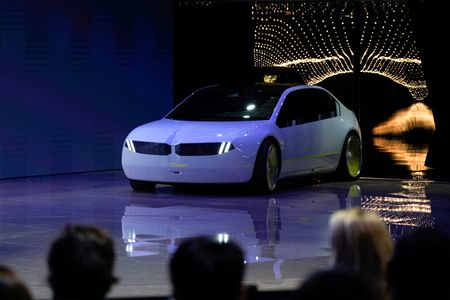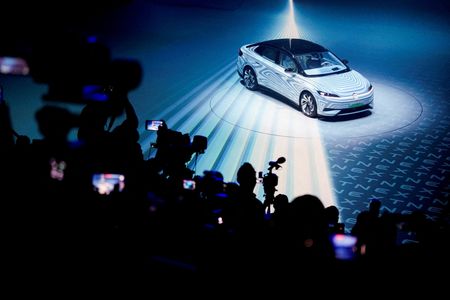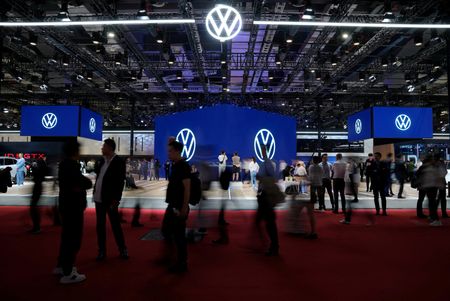 1
1 1
1



SHANGHAI/BERLIN (Reuters) -German automakers have turned up in full force at Shanghai’s Auto Show as they fight to stay on top of consumer trends in the country that will define whether they maintain their market dominance in the electric age both at home and abroad.
Their heavy presence – with the entire board of Volkswagen AG and more than 100 VW employees attending, in contrast to Japanese or French automakers – shows they are taking the challenge seriously, said Yale Zhang of Shanghai-based consultancy Automotive Foresight.
But with German companies relying on China for a third of their passenger vehicle sales, they also have the most to lose.
“A lot of features in our cars are inspired by China,” Oliver Zipse, CEO of BMW, accompanied by his sales and technology chiefs, told a news conference, adding that the Chinese market was ahead of the global curve.
His comments mark the power shift from the combustion-engine age when German cars were seen in China as the pinnacle of global engineering, to the electric age when German automakers are learning from their Chinese counterparts who have moved faster on developing technology for electric vehicles (EVs) that sets them apart.
Volkswagen executives have said the company’s unrivalled global scale will help it win the race for affordable EVs – but that capacity could turn from a blessing to a curse if sales dip, with the market share of China’s BYD Co Ltd surpassing that of the Volkswagen brand’s this year so far.
While the battery-electric vehicle market share of German automakers in China is rising, it is still miniscule. The combined market share of the battery-electric vehicle market in China held by Audi, BMW, Volkswagen and Mercedes-Benz rose to 4.8% in 2022 from 2.2% in 2020, according to a Reuters analysis of sales data from the Chinese Association of Automobile Manufacturers. The EV sales of all four German brands added up to only a quarter of BYD’s in 2022.
German carmakers’ total market share in the country rose from 19.9% in 2015 to 24.6% in 2019, but has fallen back down to 19.1%, according to data provided to Reuters by Germany’s autos association VDA.
“The Chinese market is no longer as stable for German carmakers as it was,” Thomas Luk, partner at management consultancy Kearney, said on the sidelines of the Shanghai show.
“Becoming faster won’t be enough to keep up … their business culture must change,” he said.
SHIFT IN THINKING
Analysts in Shanghai pointed to the tendency of German carmakers to market their new EVs as an electric version of their combustion-engine predecessors as a sign that the companies had not yet made the mental shift towards putting electrification first.
“It is important to see EVs as a new generation of products, rather than an extension of combustion-engine cars,” Zhang said. “Hopefully the Shanghai show can shake that misconception.”
“If foreign brands are stubborn with their thinking, they will be phased out,” Feng Xinya, president of Chinese state-owned manufacturer GAC Group, said.
As part of their push to boost China sales, German automakers have reached out to Chinese EV bloggers, marketing experts and others to gather insights on the market, said Chang Yan, one of the bloggers who was contacted.
Chinese brands have also adopted new sales strategies to make inroads in Europe which analysts said European legacy brands must learn from to keep up in the digital age.
Brands like Nio and Lynk & Co, owned by Geely and Volvo Cars, have set up community spaces, cafes and bars, which Nio has said translates into sales via peer-to-peer recommendations.
Many are also adopting direct sales, an approach German automakers like BMW and Mercedes-Benz have also said in recent months they are moving towards.
“One of the key objectives of this strategy is to control the customer experience fully,” McKinsey wrote in a December report.
Still, sources said Chinese brands were focusing first on dominating their domestic market before taking a more aggressive strategy in Europe, where Asian battery makers have already laid solid ground.
Chinese EV brands were for now setting prices higher to avoid upsetting European policymakers concerned that they will flood the market even though they are able to offer far lower prices, said a source who asked not to be named.
BYD this week unveiled the Seagull, an electric vehicle with a range of over 300 km whose price starts at just $11,000 – cheaper than many entry-level combustion-engine models in Europe. The company is planning to bring the Seal and Dolphin models to Europe later this year.
“The Chinese are more careful in Europe,” Luk said.
In China, though, the battle is fierce.
“I used to be careful with using the word ‘doomed,'” Zhang of Automotive Insight said. “But I am quite sure now, at least in China, foreign brands’ days are numbered.”
(Reporting by Victoria Waldersee in Berlin, and by Ilona Wissenbach, Zhang Yan, Kevin Krolicki, Brenda Goh and Casey HallWriting by Victoria WalderseeEditing by Ben Klayman and Matthew Lewis)